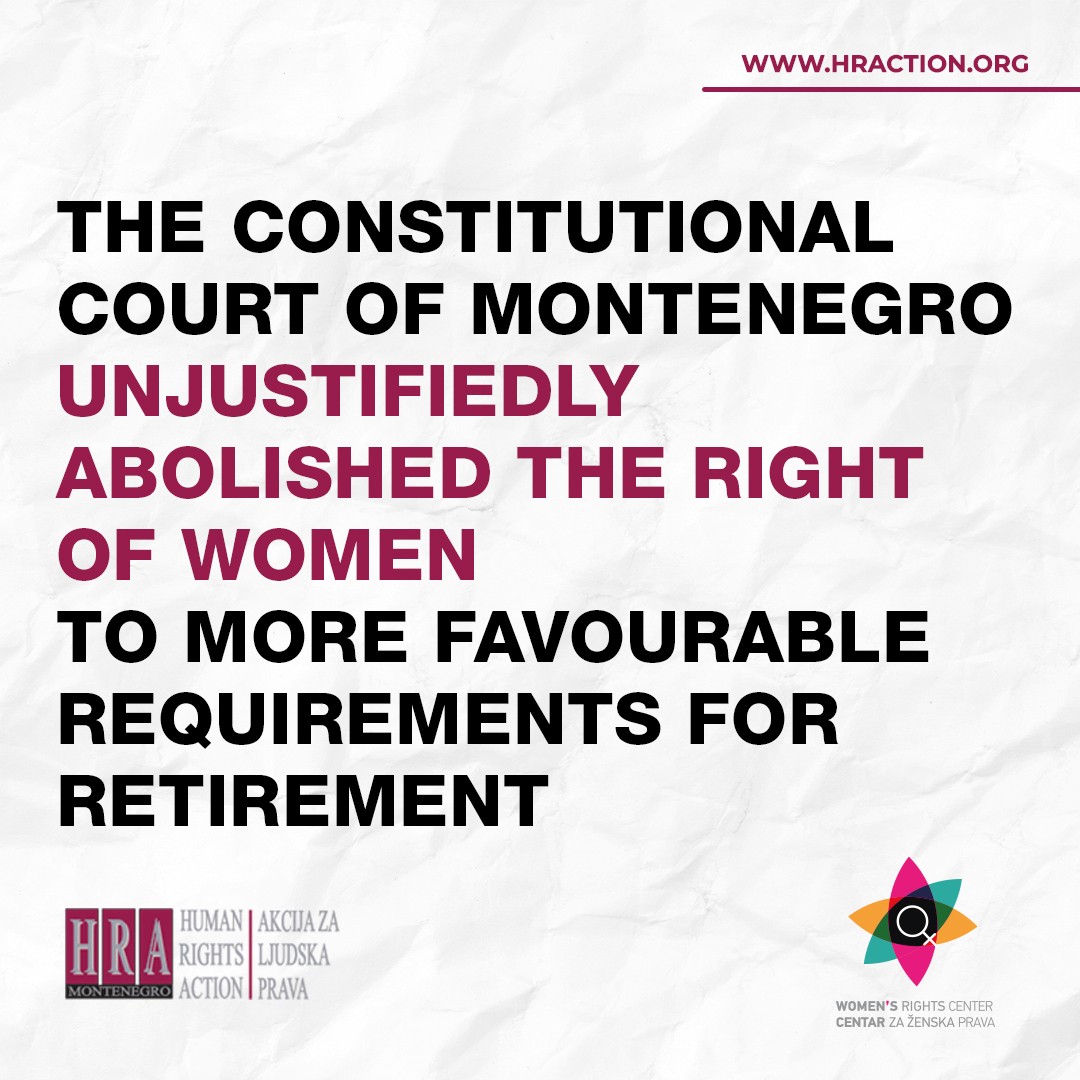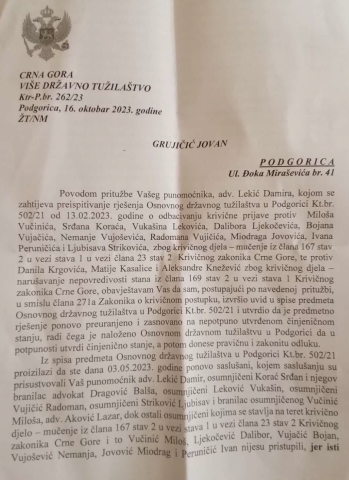
International Day for the Eradication of Poverty: Montenegro is not even close to fulfilling the 2014 recommendations of the UN Committee on Economic, Social and Cultural Rights aimed at combating poverty
17/10/2023
THE CONSTITUTIONAL COURT OF MONTENEGRO UNJUSTIFIEDLY ABOLISHED THE RIGHT OF WOMEN TO MORE FAVOURABLE REQUIREMENTS FOR RETIREMENT
27/10/2023HRA APPEAL: URGENTLY RECUSE PROSECUTOR MAJA KNEŽEVIĆ, WHOSE DECISION DISMISSING THE CRIMINAL CHARGES OF POLICE TORTURE HAS BEEN REVERSED FOUR TIMES

For the fourth time, the High State Prosecutor’s Office approved the complaint of Jovan Grujičić and reversed the decision of state prosecutor Maja Knežević to dismiss the criminal charges Grujičić filed against two police chiefs and 8 members of the Criminal Police of the Podgorica Security Centre for extortion of testimony by use of torture.
Senior State Prosecutor Željko Tomković concluded for the fourth time that the decision to dismiss the criminal charges was “once again premature and based on incompletely established facts”.
The Human Rights Action (HRA) is repeating its appeal to the Acting Supreme State Prosecutor Tatjana Begović to prevent the preliminary investigation in this important case from being returned to the same state prosecutor of the Basic State Prosecutor’s Office in Podgorica, Maja Knežević.
It is obvious that this state prosecutor, who persistently and unfoundedly keeps dismissing the criminal charges (and in whom the injured party has no confidence and is demanding her recusal), cannot ensure an effective investigation of torture in line with the international standards, which Montenegro is obliged to respect as a member state of the United Nations, the Council of Europe and a candidate for membership in the European Union.
For this reason, the HRA is asking – for the fourth time – that the preliminary investigation be taken over by a state prosecutor who will be willing and able to act in accordance with international standards of effective investigation.
For three and a half years now, there has been no progress in the case of torture to which Jovan Grujičić was subjected in the Podgorica Securty Centre on 26 May 2020. This sort of stagnation has long violated the standard of urgency, despite the fact that Grujičić’s allegations of torture he suffered in the Podgorica Security Centre were confirmed back in 2021, with the highest degree of certainty, by the local forensic medicine expert Prof. Dr. Dragana Čukić and three foreign experts – Prof. Dr. Djordje Alempijević, Dr. Pierre Duterte and Dr. Onder Ozkalipci. These foreign experts are specialised in identifying traces of torture.
In July 2023, prosecutor Knežević dismissed the criminal charges (for the fourth time) against all 10 reported police officers who, according to written documentation, were in charge of Grujičić during the period that was confirmed by medical findings to be the time when he was subjected to torture. She concluded that there was no reasonable suspicion that Grujićić was tortured by one of the reported officers who interrogated him and were constantly in charge of him because none of them admitted it, and because he was unable to recognise them until May 2023. The prosecutor concluded that it was unclear to her how Grujičić remembered certain details three years after the critical event, and how he managed to recognise the faces of people who had been masked on the day of the event. She also said she believed that Grujičić did not show interest in contributing to the resolution of the matter by testifying, since he requested that the scheduled hearing be postponed.
Drawing such conclusions was arbitrary and reckless, as Grujičić has been receiving treatment for almost three and a half years due to the consequences of police torture and the violent interruption of his hospital treatment that preceded it. The state prosecutor knew that he had been suffering from post-traumatic stress disorder caused by torture, and that he was forcibly taken from the hospital (in which he was being treated for psychosis) to be tortured in the Podgorica Security Centre. Nevertheless, she grossly disregarded his vulnerability by exposing him to secondary victimisation in the form of testifying in the presence of the police officers he marked as responsible. Although the prosecutor arbitrarily stated that Grujičić suddenly concluded that he might be able to recognise someone, the truth is that two years ago, in a statement he gave to the same prosecutor, he said that he might be able to recognise two people that tortured him. Her only job was to make this possible, by organising the lineup in a way that would not endanger him any further, by keeping him in a separate room. However, this was never done. This case, unfortunately, shows the marks of coordinated action of the Minister of the Interior and the state prosecutor aimed at removing all responsibility from the members of the criminal police unit that was in charge of Grujičić on the day he was tortured.
SENIOR STATE PROSECUTOR: In relation to the previous ruling on the dismissal of the charges, Senior State Prosecutor Tomković demanded that the facts of this case be fully established, and that Grujicić be heard once again in the presence of the suspects Miloš Vučinić, Dalibor Ljekočević, Bojan Vujacić, Nemanja Vujošević, Miodrag Jovović and Ivan Peruničić in order to establish whether and in what way they tortured him, and then to make a fair and lawful decision. Evidently, the above was not done this time either.
BACKGROUND OF THE TORTURE CASE: In an obvious attempt to “solve” the case of explosives that had been planted at the “Grand” bar and the house of security service officer Duško Golubović based on false statements, officers of the Criminal Police of the Podgorica Security Centre ill-treated Marko Boljević, a potential witness, as well as Jovan Grujičić and Benjamin Mugoša as “convenient” suspects in the case of planted explosives. Grujičić was accused and then acquitted due to lack of evidence, while Mugoša was never charged because it had turned out that he was in prison at the time of the placement of explosives, precisely as he claimed when he was questioned in the state prosecutor’s office the first time, when he reported torture.
CURRENTLY PENDING TRIALS: In the meantime, five police officers have been charged with torturing Marko Boljević and Benjamin Mugoša: inspector Dalibor Ljekočević was accused of torturing both Boljević and Mugoša, and is also being prosecuted for drug trafficking. Without a specific explanation, prosecutor Knežević dismissed the criminal charges that were filed against him for extorting a statement from Grujičić.
RESPONSIBILITY OF POLICE CHIEFS: She also dismissed the charges against the leaders of the police action, Srdjan Korać and Miloš Vučinić, who must have known what their subordinates were doing in the official premises as part of the police operation they were managing. This was contrary to the demands of the European Committee for the Prevention of Torture, which require that superior police officers bear responsibility for hierarchical management.
THE FATE OF THE REQUEST FOR RECUSAL: To this day, it has not been explained how it was possible for the state prosecutor to issue a decision dismissing the charges if a request for recusal had been filed against her. Jovan Grujičić’s attorney, Damir Lekić, submitted the request for recusal by e-mail on 9 June 2023, sending it to three addresses in Basic State Prosecutor’s Office in Podgorica: the general e-mail address of the prosecutor’s office, the e-mail address of the head of the office, and the e-mail address of the acting prosecutor. The moment prosecutor Knežević found out that a request for her recusal had been submitted, based on Article 42 of the Criminal Procedure Code she was obliged to stop working on the case, except for urgent actions, until the head of the Basic State Prosecutor’s Office in Podgorica, Duško Milanović, decided on the request. However, the attorney’s request was ignored, and Knežević continued to act unlawfully in the case, issuing a decision to dismiss the charges contrary to the statutory provisions that prohibit this.
WHAT INTERNATIONAL ORGANISATIONS EXPECT FROM MONTENEGRO: International organisations such as the United Nations (Committee against Torture, Human Rights Commission, Special Rapporteur on Torture) and the Council of Europe (European Committee for the Prevention of Torture and Other Inhuman or Degrading Treatment or Punishment – CPT) expect the State Prosecutor’s Office of Montenegro to demonstrate willingness to conduct effective investigations of credible allegations of abuse by the police. However, with such an indecisive approach to combating police torture, Montenegro will not be able to meet the expectations of the international community, achieve the rule of law or meet the criteria for membership in the European Union.
SUSPECTS: The criminal report lists the following persons as suspects in the torture of Grujičić: Miloš Vučinić, former head of the Security Department of the Criminal Police in the Podgorica Security Centre, currently head of the Regional Centre “South”; Srdjan Korać, head of the Criminal Police Station for the Suppression of Violent Crimes and Domestic Violence; as well as inspectors Vukašin Leković, Dalibor Ljekočević, Bojan Vujačić, Nemanja Vujošević, Radoman Vujičić, Miodrag Jovović, Ivan Peruničić and Ljubisav Striković. Concerning all of them, there is written documentation about the organisation of bringing Grujičić from the Special Psychiatric Hospital in Dobrota to the Podgorica Security Centre for questioning, and their participation in his interrogation.







 English
English